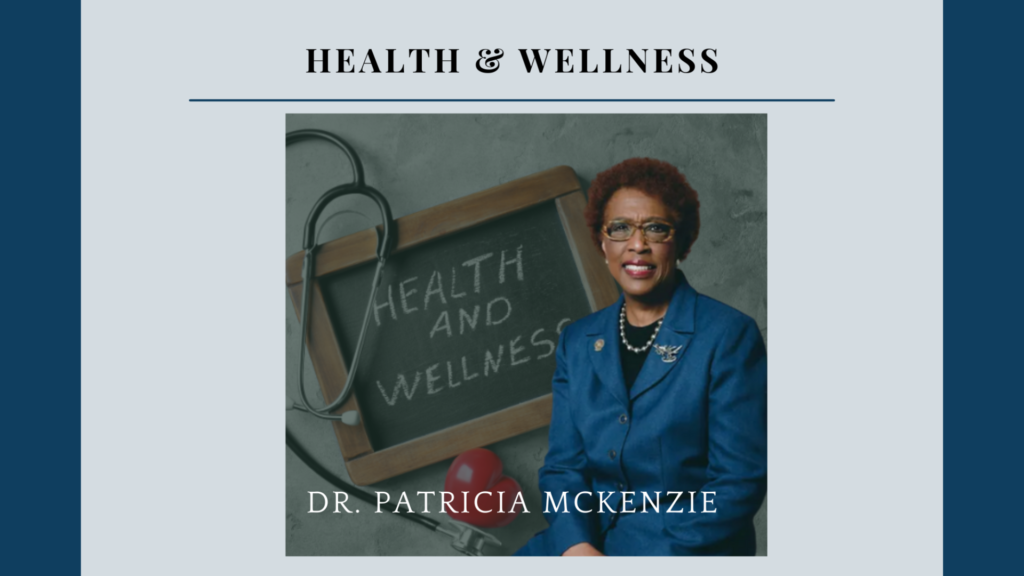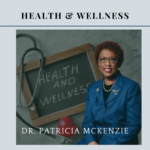
EIGHTH EPISCOPAL DISTRICT
HEALTH MINISTRY (VOL 2-2026)

Dr. Patricia D. McKenzie
Episcopal Coordinator for Health Ministries
PART I.
NATIONAL HEALTH OBSERVANCES FOR FEBRUARY
A. AMERICAN HEART MONTH
FACTS:
“ Heart disease is a leading cause of death in the U.S. for both men and women. Heart healthy living involves understanding your risk. Risk factors include-1. High blood pressure-Half of all American adults have high blood pressure. A healthy pressure is less 120 (systolic)/80 (diastolic). Elevated 120- 129 (systolic) and less than 80 (diastolic). . High blood pressure Stage | is 130- 139 (systolic) OR 80-89 (diastolic). Hypertension Crisis is higher than 120 (systolic) and higher than 80 (diastolic). Contact your Dr. immediately. Your blood pressure is taken at each visit to the Dr. You may be asked to monitor it at home using a home kit, keep a record and take it with you to the Dr. About 1 in 3 US adults with high blood pressure are not aware that they have it. To control or lower high blood pressure, you may need to adopt a Heart- Healthy Lifestyle: You can lower your risk of developing heart disease that could lead to a heart attack.
CHANGES:
- Get enough quality sleep, aim for 7-8 hrs. each night; go to bed and wake at the same time each day;
- Exercise regularly, but not within 2-3 hours before bed time, avoid caffeine and nicotine
- Eat Better, mix lean cuts of meat, eat fish once or twice a week, eat two or more meatless meal each week; eat mor fruits, unsalted snacks; fat- free and low-fat snacks or more raw vegetables as a snack.
- STOP Smoking- Any amount of smoking damages your heart and blood vessels. CALL-1-800- Quit-Now also visit Smokefree.gov to get additional support.
- Main a Healthy Weight- Choose healthy snacks like fruits, vegetables nuts; Stay hydrated with water as primary beverage; Discuss Exercise Plan with Dr. first! May include 150 minutes moderate-intensity aerobic exercise (such as brisk walking) or 75 minutes of rigorous-intensity (like running) exercise) exercise per week. Be more active, sit less, park further away. If you don’t have a lot of time in your day, try being active for 10 minutes at a time.
- CONTROL CHOLESTEROL-Eat healthy diet, low in saturated fats, limit alcohol consumption (not more than 2 drinks a day for men or 1 drink a day for women).
- Manage STRESS to improve emotional and physical health. Use relaxation techniques, meditation, chair yoga.
- Manage BLOOD SUGAR, especially for those with diabetes or those at risk of developing diabetes. Follow the schedule for checking the blood.
- Stroke when blood flow to the brain is clogged and can lead to disabilities and learning problems.
- . Practice Self-Care and find Social Support for activities.
- For more information, VISIT hearttruth.gov.
B. EVENT: NATIONAL “WEAR RED DAY" is February 6
In support of women’ cardiovascular health. Cardiovascular disease is the number One Killer of women. Together we are stronger than heart disease and stroke.
C. TEEN DATING VIOLENCE AWARENESS MONTH
FACTS:
FACTS: “ “Teen dating violence affects nearly 10% of all teenagers throughout the U.S.”
- It includes physical, psychological or sexual abuse; harassment or stalking of any personages 12 to 18 in the context of a past or present romantic or consensual relationship. PHYSICAL-Hitting, biting, hair pulling, scratching; EMOTIONAL or PSYCHOLOGICAL-name calling, bullying, constant monitoring; SEXUAL- forcing a teen partner to engage against or without their consent; STALKING- following or harassing in a way that causes fear for their safety or well-being. This can be done in person, on social media telecommunications, electronically. While boys and girls can be victims, girls are more likely to suffer. Girls between 16 and 24 are three times as likely to be abused. Romantic relationships are seen as early as 12or 13. Teens involved in unhealthy or abusive relationships are more likely to suffer from depression, anxiety, alcohol or drug abuse, anorexia or bulimia, thoughts of suicide. Many domestic abusers were abused as a child or teenager. PREVENTION- Encourage open and free communication. Teens don’t talk because they are embarrassed and afraid of repercussions from parent and peers. Important to talk to boys and girls and establish trust, respect and honesty in relationships.
- Listen to their teens and recognize these five warning signs of an unhealthy relationship:
- 1.They try to control you (E.G. Get angry when you are with family and friends
- 2 . They don’t respect your boundaries (E.G. You say no and they keep pushing)
- 3. They put you down or make you feel small (E.G. Insults about looks, clothes, or blaming you for their anger or mistakes)
- 4. They use anger or guilt to control you (E.G.. If you love me, you would,,)
- 5. They isolate you from your friends and family (E.G. frequent comments about other connections in you life)”
PART II.
HEALING AIDS FROM THE BALM IN GILEAD
Source:
Click on Education and Inspiration and find to topics-Sunday Morning Health Corner and Resources
Facts:
PART III.
CENTER FOR DISEASE CONTROL AND PREVENTION
A.COVID-19, Flu and RSV
FACTS:
Reminders-
- 1. You can still develop COVID-19 up to 10 days after you have been exposed;
- 2. People may choose to wear a mask at any time to protect self and others.
The new variant: SARS CoV-2Variant BA.2.86. The updated COVID-19 vaccine will be available in mid-September. CDC’s current assessment is that this vaccine will likely be effective at reducing severe disease and hospitalization. There is no evidence that this variant is causing more severe illness.
Prevention actions to protect yourself and others:
- 1. Get COVID-19 vaccine as recommended;
- 2. Stay home if sick;
- 3. Get tested if sick;
- 4. Seek treatment if you have COVID-19 and are at high risk of getting very sick;
- 5. Wear a high-quality mask that fits well over your nose and mouth;
- 6. Improve ventilation;
- 7 Wash your hands.
*Influenza (Flu)-
September and October are good times to get flu vaccine. Talk with your Doctor.
*RSV-Respiratory Syncytial Virus-
Can severely impact older adults and adults with underlying chronic condition; Contagious virus occurs during fall peaks in the winter and subsides in spring; vaccination is available. Talk with your Dr.”
